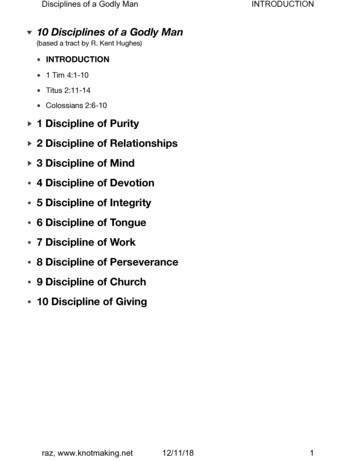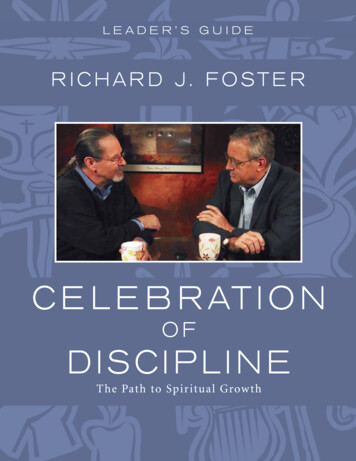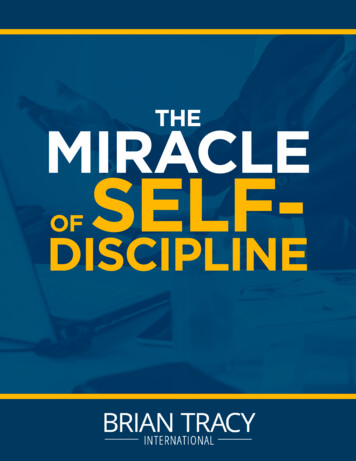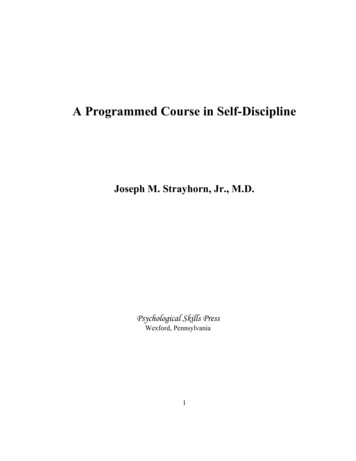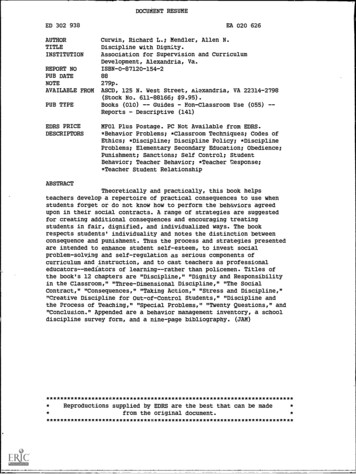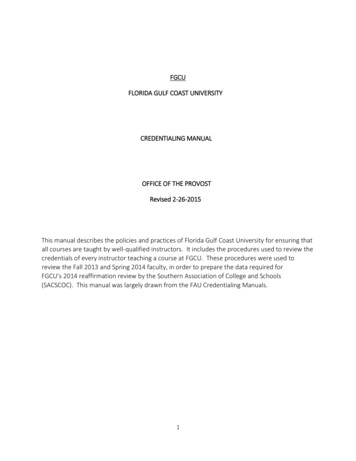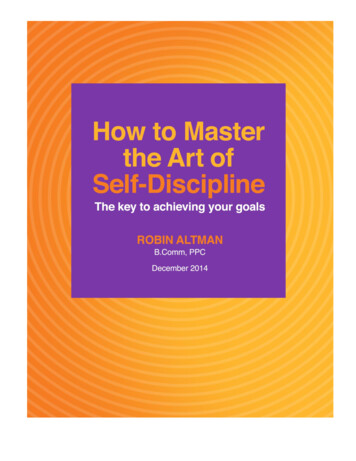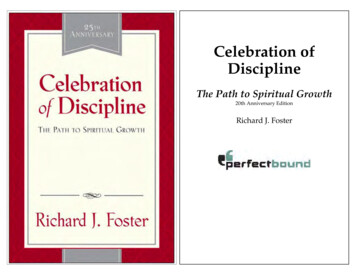
Transcription
Celebration ofDisciplineThe Path to Spiritual Growth20th Anniversary EditionRichard J. Foster
ContentsTo Carolynnwife, counselor, companion, encouragerAcknowledgmentsvForeword by D. Elton TruebloodixIntroductionxi1. The Spiritual Disciplines: Door to Liberation1Part I. The Inward Disciplines132. Meditation153. Prayer334. Fasting475. Study62Part II. The Outward Disciplines776. Simplicity797. Solitude968. Submission1109. Service126Part III. The Corporate Disciplines14110. Confession14311. Worship15812. Guidance17513. Celebration190In Celebration of Celebration of Discipline202Notes211Bibliography222
iv / RICHARD J. FOSTERScripture Index227Subject Index231About the Author246Also by Richard J. Foster247Other Renovaré Resources for Spiritual Renewal248Copyright249About the Publisher250Richard J. Foster's Study Guide for Celebration of Discipline251ACKNOWLEDGMENTS1978Books are best written in community. I am deeply indebted to thosewhose lives have surrounded mine and have given substance to theideas in this book. It was through the friendship and teaching ofDallas Willard that I first saw the meaning and necessity of theSpiritual Disciplines. His life is the embodiment of the principles ofthis book.I owe much to Bess Bulgin, who carefully and prayerfully readeach line of this book many times over. Her feel for rhythm hasgreatly enhanced its readability. Ken and Doris Boyce helped memore than they will ever know by their constant encouragementand enthusiasm. The help of Connie Varce, in typing, grammar, andoptimism, added a great deal. Mary Myton worked endlessly intyping both rough draft and the final manuscript. Stan Thornburgtaught me about the Discipline of service with his words and hislife. Rachel Hinshaw graciously offered her skills as a professionalproofreader. My special thanks to Newberg Friends Church for releasing me to have time to write in the final weeks of this book, andespecially to Ron Woodward, whose pastoral load of necessity increased as mine decreased.I thank my wife, Carolynn, and our children, Joel and Nathan, fortheir incredible patience throughout the writing of this book.1988It has been ten years since Celebration of Discipline was first published.I still find it true that books are best written in community; the onlydifference now is that the community tov
vi / RICHARD J. FOSTERCELEBRATION OF DISCIPLINE / viiwhich I am indebted is vastly larger. Over the years numerous persons have written to encourage, challenge, correct, and stimulatemy thinking. In addition, many have talked with me in person abouttheir own strivings, learnings, and growings. All of these peopleand more have taught me much about the spiritual life and havecontributed to this revision.I especially want to thank my wife, Carolynn, who over the yearshas taught me more about walking with God than words can express.The dedication of this book to her has even more relevance nowthan it did ten years ago. Also, I want to express my appreciation tomy administrative associate, Lynda Graybeal, who has workedtirelessly on the many details of this revision.As I revise Celebration, I am struck profoundly by the weaknessof words. At best they are broken and fragmented witnesses to God’struth. We do indeed see through a glass darkly. And yet I am struckeven more profoundly by the fact that God can take something soinadequate, so imperfect, so foolish as words on paper and use themto transform lives. How this happens I do not know. It is a miracleof grace and points to the fact that, if there is anything in these pagesthat ministers life to you, it did not come from me. Soli Deo Gloria!1998Twenty years ago I wrote, “Books are best written in community.”Ten years ago I reaffirmed that confessional statement, adding, “theonly difference now is that the community to which I am indebtedis vastly larger.” So it is today, double and triple.I would like, however, to add one difference now that was nottrue before: various ones of our ever-expanding community havesince traveled through the Valley of the Shadow. They now live onthe other side, overflowing, I have no doubt, with utter joy andcomplete fulfillment.The first of these to travel this journey was Bess Bulgin. When Iwas writing Celebration, I met with Bess weekly, and she would critique my work. Bess was a poet and brought a poet’s eye to all thatI wrote. More than just critique happened though: a friendship wasforged, rich and abiding.Then I moved. I did not know if Bess and I would ever meet againthis side of the Valley. We did. We both sensed it would be our lasttime together and said so. We talked and reminisced. She shared anew poem with me. Then, with trembling voice, I read the closingparagraph from the final book of The Chronicles of Narnia to her: “butthe things that began to happen after that were so great and beautifulthat I cannot write them. And for us this is the end of all the stories,and we can most truly say that they all lived happily ever after. Butfor them it was only the beginning of the real story. All their life inthis world and all their adventures in Narnia had only been thecover and the title page: now at last they were beginning ChapterOne of the Great Story, which no one on earth has read: which goeson forever: in which every chapter is better than the one before.”I finished reading, and we sat together in perfect silence. Then Ileft, traveling back to my new home. Not long after Bess left too,traveling to her new home beyond the Valley of the Shadow.Such loss is a reality we all must face at one time or another, perhaps many times over. Hear, then, these bracing words of CharlesWesley:If DEATH my friend and me divide,thou dost not, Lord, my sorrow chide,or frown my tears to see;restrained from passionate excess,thou bidst me mourn in calm distressfor them that rest in thee.I feel a strong immortal hope,which bears my mournful spirit up
viii / RICHARD J. FOSTERbeneath its mountain load;redeemed from death, and grief, and pain,I soon shall find my friend againwithin the arms of God.Pass a few fleeting moments moreand death the blessing shall restorewhich death has snatched away;for me thou wilt the summons send,and give me back my parted friendin that eternal day.FOREWORDThere are many books concerned with the inner life, but there arenot many that combine real originality with intellectual integrity.Yet it is exactly this combination that Richard Foster has been ableto produce. Steeped as he is in the devotional classics, the authorhas given us a careful study that may, itself, be valued for a longtime. Though the present volume demonstrates indebtedness to theClassics, it is not a book about them; it represents, instead, genuinelyoriginal work.What strikes us at once is the comprehensive character of thecurrent undertaking. Many contemporary books deal with particularaspects of the inner life, but this one is different in that it deals withan astonishing variety of important topics, much of its freshness oftreatment arising from its boldness. The author has undertaken toexamine a wide spectrum of experience, from confession to simplicityto joy. Since the finished product is the outcome of wide readingand careful thinking, it is not the sort of book that can be dashed offquickly or cheaply.The sources of insight are varied, the chief ones being the HolyScriptures, and the recognized classics of devotion, but these are notthe only fountains from which the author draws. The careful readersoon recognizes a large indebtedness to secular thinkers as well. Inview of the fact that the author is himself a Quaker, it is not surprising that the contributions of the classic Quaker writers are prominent.These include the works of George Fox, John Woolman, HannahWhitall Smith, Thomas Kelly, and many more. The purpose here isnot sectarian but genuinely ecumenical, since important insightsought never to be limited to the group from which they arise. Whatwe are given, accordingly, is an example of the catholicity of sharing.The treatment of simplicity is especially valuable, partly be-ix
x / RICHARD J. FOSTERcause it is not simple. Indeed the ten “controlling principles” concerning simplicity, which are explained in Chapter 6, are themselvessufficient justification for the appearance of another book on thespiritual life. The ten principles enunciated, while rooted in ancientwisdom, are made astonishingly contemporary.The author understands very well that the emphasis upon simplicity may itself become a snare. This is why he will not settle foranything so obvious as the adoption of a plain garb, though he cansay tersely, “Hang the fashions. Buy only what you need.” Here isa radical proposal which, if widely adopted, would be immenselyliberating to people who are the victims of the advertisers, particularly those on television. A genuine cultural revolution would ensueif considerable numbers were to obey the trenchant command, “Deaccumulate.”The greatest problems of our time are not technological, for thesewe handle fairly well. They are not even political or economic, because the difficulties in these areas, glaring as they may be, arelargely derivative. The greatest problems are moral and spiritual,and unless we can make some progress in these realms, we may noteven survive. This is how advanced cultures have declined in thepast. It is for this reason that I welcome a really mature work on thecultivation of the life of the spirit.D. Elton TruebloodINTRODUCTIONIt is a wonder to me how God uses squiggles on paper to do hiswork in the hearts and minds of people. How are these squigglestransformed into letters and words and sentences and, finally,meaning? Oh, we may congratulate ourselves on knowing a littleabout the function of neurotransmitters in the brain or about howendorphin proteins affect learning and memory retention, but if weare honest, we know that thinking itself is a mystery. Doxology isthe only appropriate response.At this writing, it has been two decades since this particular setof squiggles, Celebration of Discipline, was first published. After thefirst decade, the publisher, no doubt puzzled by its longevity andpopularity, wanted to celebrate this milestone, and asked me to revisethe original text—which I was glad to do. And now, after a seconddecade, the puzzle continues. Somehow (who can ever explain how?)people continue to find help in their daily walk with God throughthe pages of this book. To celebrate this twentieth anniversary, thepublisher has asked me to write an introduction, and, again, I amglad to comply. And perhaps in fulfilling their request it is appropriate to tell how the book you hold in your hands came into being.Spiritual BankruptcyFresh out of seminary, I was ready to conquer the world. My firstappointment was a small church in a thriving region of SouthernCalifornia. “Here,” I mused, “is my chance to show the denominational leadership, nay, the whole world, what I can do.” Believe me,visions of far more than sugar plums were dancing in my head. Iwas sobered a bit when the former pastor,xi
xii / RICHARD J. FOSTERupon learning of my appointment, put his arm on my shoulder andsaid, “Well, Foster, it’s your turn to be in the desert!” But the“sobering” lasted only a moment. “This church will become a shininglight set on a hill. The people will literally flood in.” This I thought,and this I believed.After three months or so I had given that tiny congregationeverything I knew, and then some, and it had done them no good.I had nothing left to give. I was spiritually bankrupt and I knew it.So much for a “shining light on a hill.”My problem was more than having something to say from Sundayto Sunday. My problem was that what I did say had no power tohelp people. I had no substance, no depth. The people were starvingfor a word from God, and I had nothing to give them. Nothing.Three Converging InfluencesIn the wisdom of God, however, three influences were convergingin that little church that would change the direction of my ministry,indeed, of my whole life. Together they would provide the depthand the substance I needed personally and the depth and the substance that, in time, would lead to the penning of Celebration. Butthat is running ahead of my story.The first thing to happen was precipitated by an influx of genuinely needy people into our small congregation. They simply flowedin like streams after a thunderstorm. Oh, how they hungered forspiritual substance and, oh, how willing they were to do almostanything to find it. These were the castoffs of today’s fast-track culture—“the sat upon, spat upon, ratted on”—and so their needinesswas quite obvious. Just as obvious was my inability to give themsubstantive pastoral care.This lack of any real spiritual density led me, almost instinctively,to the Devotional Masters of the Christian faith—Augustine of Hippoand Francis of Assisi and Julian of Norwich and so many others.Somehow I sensed that these ancient writersCELEBRATION OF DISCIPLINE / xiiilived and breathed the spiritual substance these new friends in ourlittle fellowship were seeking so desperately.To be sure, I had encountered many of these writers in academicsettings. But that was a detached, cerebral kind of reading. Now Iread with different eyes, for daily I was working with heartbreaking,soul-crushing, gut-wrenching human need. These “saints,” as wesometimes call them, knew God in a way that I clearly did not. Theyexperienced Jesus as the defining reality of their lives. They possesseda flaming vision of God that blinded them to all competing loyalties.They experienced life built on the Rock.It hardly mattered who I read in those days—Brother Lawrence’sThe Practice of the Presence of God, Teresa of Avila’s Interior Castle,John Woolman’s Journal, A. W. Tozer’s The Knowledge of theHoly—they knew God in ways far beyond anything I had ever experienced. Or even wanted to experience! But as I continued to soakin the stories of these women and men who were aflame with thefire of divine love, I began desiring this kind of life for myself. Anddesiring led to seeking and seeking led to finding. And what I foundsettled me, deepened me, thickened me.The second influence came from an individual in that tiny congregation, Dr. Dallas Willard. A philosopher by profession, Dallas waswell versed in the classics, and, at the same time, had an uncannyperception into the contemporary scene. He taught our fledglinglittle group: studies in Romans and Acts and the Sermon on theMount and the Spiritual Disciplines and more. But regardless of thespecific topic, he constantly drew us into the big picture. It was lifebased teaching that always respected the classical sources and alwayssought to give them contemporary expression. Those teachings gaveme the Weltanschauung, the worldview, upon which I could synthesize all my academic and biblical training.But it wasn’t just the teaching, or at least it wasn’t teaching as weusually think of teaching. It was a heart-to-heart communicationthat went on between this world-class philosopher and
xiv / RICHARD J. FOSTERthat little ragtag band of Christ’s disciples. Dallas taught us right inthe midst of our struggles, our hurts, our fears. He had descendedwith the mind into the heart and taught out of that deep center.Today, many years later, I still revel in the impact of those teaching/living/praying sessions. It was, of course, teaching-in-community. We were in each other’s homes—laughing together, weepingtogether, learning together, praying together. Some of the bestteaching times grew out of the dynamic of those home settings wherewe might go late into the night—posing questions, debating issues,applying gospel truth to life’s circumstances. Dallas would moveamong us, teaching, always teaching. A spiritual charisma of teaching, I think. Teaching with wisdom. Teaching with passion. Teachingwith heart. And always we experienced a sense of the numinous.The third influence came initially from a Lutheran pastor, WilliamLuther Vaswig. (With a name like “William Luther Vaswig” howcould he pastor anything but a Lutheran church?) Bill’s church, largeand influential, overshadowed our tiny Quaker fellowship. But whatdrew me to Bill had nothing to do with “large” or “influential” oreven “Lutheran.” No, what I saw was someone thirsting for thethings of God. So I sought him out. “Bill,” I said, “you know moreabout prayer than I do. Would you teach me everything you know?”Now, the way Bill taught me about prayer was by praying. Lively,honest, heartfelt, soul-searching, hilarious praying. As we did this,over time we began experiencing that “sweet sinking into Deity”Madame Guyon speaks of. It, very honestly, had much the same feeland smell as the experiences I had been reading about in the Devotional Masters.This movement into prayer was actually a two-pronged influence.My praying experiences with Bill were augmented by those of awonderfully determined woman, Beth Shapiro, who was the headof the elders for our little fellowship. Beth was a nurse at a largehospital, and after working the night shift, she would come over toour church building in the early morningCELEBRATION OF DISCIPLINE / xvand we (Beth and I) would spend an hour or two praying for people.All kinds of people. People in our fellowship and people outsideour fellowship. Whomever and whatever, Beth would want to prayfor them.Then we would often discuss issues of theology, of faith, of life.And whatever we talked about Beth tested out at the hospital. If wediscussed the Bible’s teaching on “the laying on of hands,” at workBeth would put her hands into the rubber gloves of an incubatorand place them on a premature infant, praying silently and lovingly,and watch that little one increase in health and well-being. Thesewere the kinds of things Beth would do, not just now and again, butrepeatedly. Through Beth I learned the necessity of bringing spiritualrealities into the press of raw humanity.Now, these three influences converged in those days of my youngpastoring, and the result was a quiet revolution, inside and out. Andin our fellowship of needy seekers we were experimenting witheverything we were learning. Those were heady days, for we sensedwe were on to something of enormous significance. We were hammering out on the hard anvil of daily life all that appeared yearslater in Celebration of Discipline. But these influences by themselvesdid not move me into actual writing. More was needed.Three Empowering CatalystsThis “more” came in the form of three separate and quite differentcatalysts. The first came by the hand of Bill Cathers, a former missionary and a man of unusual discernment and wisdom. It happenedin this way. Growing out of three days of fasting and praying, I felta concern to call Bill and invite him to pray for me. That was theextent of my guidance, only that he pray for me; I had not theslightest idea what he should pray or even why. He agreed to come.When Bill arrived, the very first thing he did was to begin confessing his sins to me. I sat there astonished. “What is he doing?
xvi / RICHARD J. FOSTERHe’s the spiritual sage.” These were my inner thoughts, but I waitedin silence. Finally, he finished, and I spoke over him those liberatingwords of 1 John 1:9, “If we confess our sins, he who is faithful andjust will forgive us our sins and cleanse us from all unrighteousness.”Then Bill, looking right at me—and right through me—asked everso quietly, “Now, do you still want me to pray for you?” He hadseen into my heart! He knew that I had put him high on a pedestalas some spiritual guru, and he was pulling all that down into acrumpled heap. Sobered by his discernment, I replied simply, “Yes,I do.”He then laid his hands on me and prayed one of the deepestprayers I have ever received. The power of that prayer is still withme today. I cannot begin to convey to you the height and the depth,the length and the breadth of his prayer, but I will tell you one wordhe spoke—a power-filled word, a prophetic word. “I pray,” he said,“for the hands of a writer.”There it was. I had longed to write for years. But I had never tolda living soul about this secret desiring. I was too shy to tell anyone.On that day I felt empowered for the ministry of writing, and whileCelebration lay some years in the future, I did begin the necessaryapprenticeship by writing numerous magazine articles.The second catalyst was D. Elton Trueblood, a respected authorof some thirty-six books. By now I was serving on an innovativepastoral team in the Pacific Northwest in what church-growth specialists call “the large church.” It was a place where things, seemedto go right no matter what I did. It was also a time for ponderinglessons learned and considering whether they had broader application.During this period I attended a national gathering of Quakerleaders among whom was Dr. Trueblood. Following the conference,my coworker Ron Woodward and I stayed a couple of extra daysto do some sermon planning for the months ahead.So it was that I happened upon Dr. Trueblood in the hotel lobby.His genuine interest and kindness toward one totally unknowncannot be overstated. After a few moments of con-CELEBRATION OF DISCIPLINE / xviiversation, he turned to me abruptly and asked what book I waswriting. The question came as a complete shock, and I stammeredout something about not being ready for a book-length effort, butthat I was writing several articles. “Hmmm,” he mused. “Yes, thatis fine. But soon you must write a book!” The words carried suchauthority and weight that I could not get them out of my consciousness. He “spoke truth to power” into me on that day.Returning home, I dared to write Trueblood, indicating that I didindeed have an idea for a book, and I enclosed a brief summary ofwhat today is Celebration of Discipline. He wrote back a warm andencouraging response accompanied by one stern counsel: “Be certainthat every chapter forces the reader into the next chapter.” It was acounsel that did indeed inform the order of Celebration.There was a third catalyst. While the other two experiences weresharp and dramatic, this final one was protracted and inconspicuous.It came from Ken and Doris Boyce, longtime friends who had steppedinto something of a parenting role in my life after my own biologicalparents had passed through the Valley of the Shadow.They helped in innumerable ways. When I was in graduate school,Doris (in those distant days before computers) typed many a termpaper for me, including my doctoral dissertation. She was alwayscareful to tell me how wonderful they all were—even the ones sotechnical that she had little idea what I was writing about.Through the years Ken talked theology-in-the-marketplace withme, and illustrated it for me. Doris always encouraged me, perhapsto a fault. Both were always careful never to say too much about mywriting, but always to reassure me in my writing. They cheered meon from the sidelines and believed in me when I could hardly believein myself.At one critical period, Ken and Doris let me use their motor homeso that I could have uninterrupted space for writing. There I wouldsit, shaping ideas, crafting words, striking them out and re-shapingand re-crafting. I wrote the first pages of
xviii / RICHARD J. FOSTERCelebration in that motor home in the driveway of Ken and DorisBoyce.These three experiences catapulted me into writing. But writingis not publishing. Frankly, I knew nothing about the world of agentsand editors, galleys and page proofs. To move from writing to bookpublishing took a series of events beyond my control.Three Divine ProvidencesA writer’s conference was being held in nearby Portland, Oregon.Prior commitments made it impossible for me to attend but I paidfull tuition for the event solely for the opportunity of a ten-minuteinterview with a representative from Harper & Row. I knew Harpersto be a general house publisher with a sturdy religion division anda solid reputation for serious literature. One thing that I, quite fortunately, did not know was that it was unheard of for an unpublishedwriter to approach such a prestigious House.Thus I met Roy M. Carlisle, religion editor for Harpers. Our timetogether went well, and he asked me to send him a full book proposal. I did so immediately and boldly stated in my cover letter, “Thisbook is for all those who are disillusioned with the superficialitiesof modern culture, including modern religious culture.”Mr. Carlisle replied to my proposal in a timely fashion, and I shallalways remember verbatim the opening sentence of his letter: “In aword we are wildly enthusiastic about your proposal.” Of the morethan seven hundred unsolicited manuscripts submitted to Harpersthat year, mine was the only one accepted. Why, I could not imagine!What I did not know was that a second providence was underway. At the very time I was in conversations with Mr. Carlisle, EltonTrueblood sent my book summary, along with his hearty recommendation, to Clayton Carlson, Religion Publisher for Harper &Row. Elton had published all of his thirty-six booksCELEBRATION OF DISCIPLINE / xixwith the House of Harper and had a long-standing relationship withMr. Carlson. He, no doubt, opened doors that otherwise might havebeen closed to me. I knew nothing of this detail all these twenty-plusyears, only recently learning about it from Mr. Carlson. Truebloodnever once mentioned it.But there is more. With the acceptance of the book proposal, I wasfaced with a difficult dilemma. The responsibilities at the churchdemanded full attention: sermon preparation, hospital calls, counseling, and more. In addition, the publication deadline threw meinto a panic. How could I do it? I, in fact, knew that I could not. So,what should I do? I was baffled. The only option I could imaginewas to decide against writing the book.At this critical juncture the wisdom of our team ministry approachproved itself. Ron Woodward, the head of our team, stepped forwardin an act of sheer grace and self-sacrifice, volunteering to cover allpreaching assignments until I finished the manuscript. Our elderstoo recognized this as a crucial opportunity. Thus, for the sake ofthe larger Christian community, they freed me from virtually allother pastoral responsibilities so I could devote my energies exclusively to writing. This I did, twelve to fifteen hours a day, for thirtythree days. To be sure, more work had to be done, but the basicstructure of the book was completed in that concentrated period ofwriting. Never before or since have I had such complete freedomfrom all concerns and responsibilities, and it was to my mind aninspired and selfless act on the part of the church elders and Ronand the other team members. So it was that Celebration of Disciplinecame into being.What then, I ask you, is this book really? Nothing but squiggleson paper. But through the grace of God it has been used, lo thesetwenty years, as an instrument for human transformation. For thisI thank God. And what of its future? That I gladly leave in the handsof Divine Providence. Soli Deo Gloria.Richard J. FosterSeptember 1997
1. THE SPIRITUAL DISCIPLINES:DOOR TO LIBERATIONI go through life as a transient on his way to eternity, made inthe image of God but with that image debased, needing to betaught how to meditate, to worship, to think.—DONALD COGGANSuperficiality is the curse of our age. The doctrine of instant satisfaction is a primary spiritual problem. The desperate need today is notfor a greater number of intelligent people, or gifted people, but fordeep people.The classical Disciplines* of the spiritual life call us to move beyondsurface living into the depths. They invite us to explore the innercaverns of the spiritual realm. They urge us to be the answer to ahollow world. John Woolman counsels, “It is good for thee to dwelldeep, that thou mayest feel and understand the spirits of people.”1We must not be led to believe that the Disciplines are only forspiritual giants and hence beyond our reach, or only for contemplatives who devote all their time to prayer and meditation. Far fromit. God intends the Disciplines of the spiritual life to be for ordinaryhuman beings: people who have jobs, who care for children, whowash dishes and mow lawns. In fact, the Disciplines are best exercised in the midst of our relationships with our husband or wife,our brothers and sisters, our friends and neighbors.*You may be wondering why the Disciplines described in this book are termed “classical.”They are not classical merely because they are ancient, although they have been practicedby sincere people over the centuries. The Disciplines are classical because they are centralto experiential Christianity. In one form or another all of the devotional masters have affirmedthe necessity of the Disciplines.1
2 / RICHARD J. FOSTERNeither should we think of the Spiritual Disciplines as some dulldrudgery aimed at exterminating laughter from the face of the earth.Joy is the keynote of all the Disciplines. The purpose of the Disciplines is liberation from the stifling slavery to selfinterest and fear.When the inner spirit is liberated from all that weighs it down, itcan hardly be described as dull drudgery. Singing, dancing, evenshouting characterize the Disciplines of the spiritual life.In one important sense, the Spiritual Disciplines are not hard.* Weneed not be well advanced in matters of theology to practice theDisciplines. Recent converts—for that matter people who have yetto turn their lives over to Jesus Christ—can and should practicethem. The primary requirement is a longing after God. “As a hartlongs for flowing streams, so longs my soul for thee, O God. Mysoul thirsts for God, for the Living God,” writes the psalmist (Ps.42:1, 2).Beginners are welcome. I, too, am a beginner, even and especiallyafter a number of years of practicing every Discipline discussed inthis book. As Thomas Merton says, “We do
ideas in this book. It was through the friendship and teaching of Dallas Willard that I first saw the meaning and necessity of the Spiritual Disciplines. His life is the embodiment of the principles of this book. I owe much to Bess Bulgin, who carefully and prayerfully read each line of this

